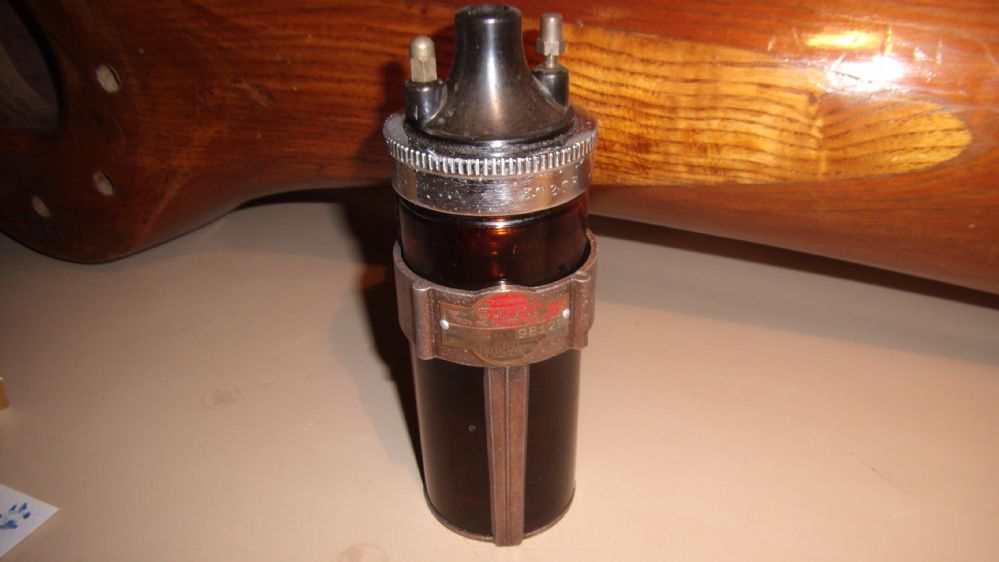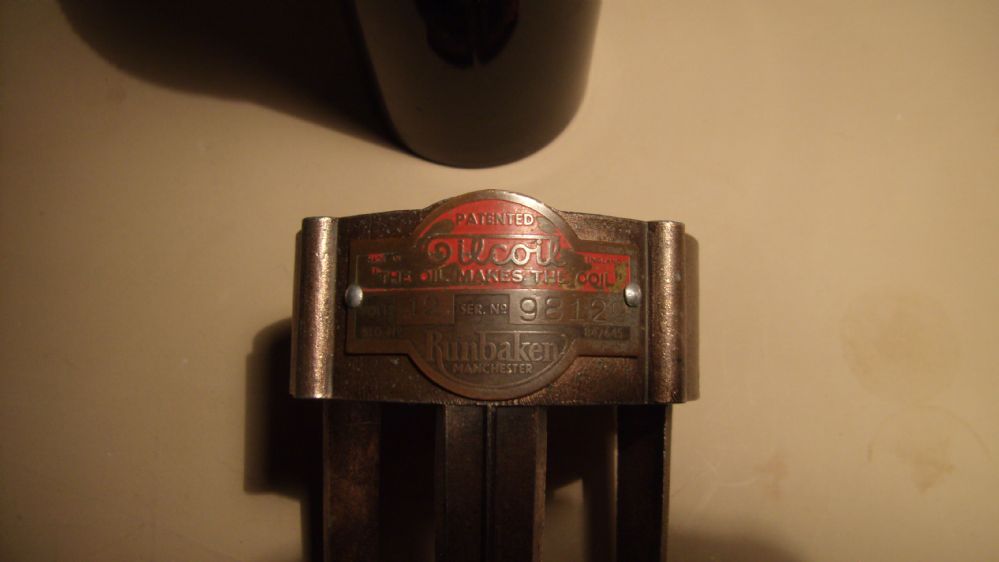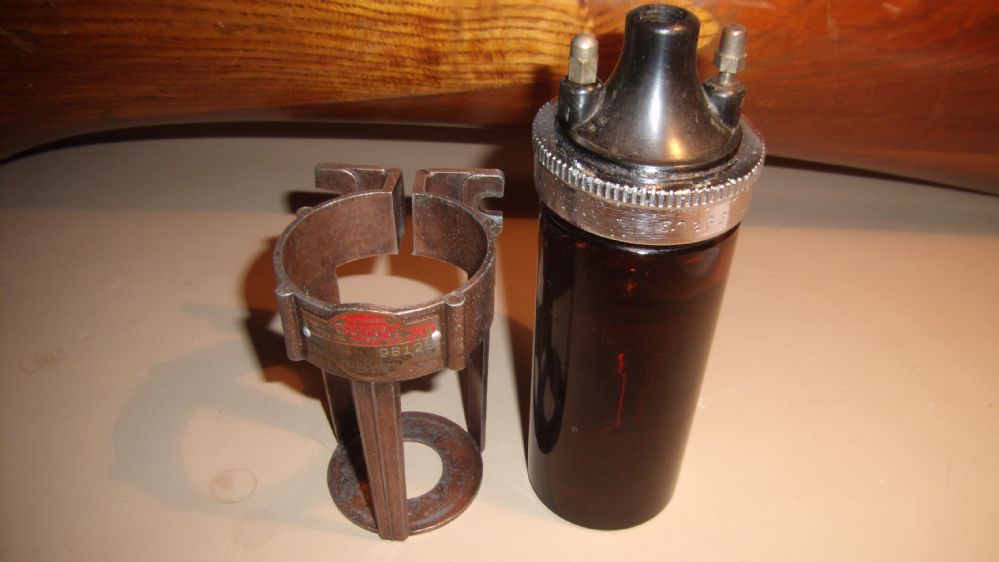| Author |
 Topic Topic  |
|
Moth eaten
Australia
956 Posts |
 Posted - 09/11/2015 : 10:28:49 Posted - 09/11/2015 : 10:28:49

|
This might be of interest for the die hards! My 33 L1 had this fitted
and it works without fault. I would think its always been there.
Its a delightful part contained in its original copper plated die cast bracket. Riveted to the bracket is the makers plaque.
I found another that had been sold with box.



N.D.Willey |
|
|
JCB
United Kingdom
384 Posts |
 Posted - 10/11/2015 : 17:07:34 Posted - 10/11/2015 : 17:07:34

|
Dear Moth eaten:
Ok ! I am hooked.
I have googled this item and still don't understand the idea.
Do you have the background or other information?
Is it gimmick? Did it work at all? Does it work now?
Thank-you.
John Bakewell |
 |
|
|
Orstin
United Kingdom
673 Posts |
 Posted - 10/11/2015 : 17:41:59 Posted - 10/11/2015 : 17:41:59

|
Do they work? Well, the one I've had on my Austin 7 saloon since I bought it in 1970 (and it clearly wasn't new then) is still throwing out healthy blue sparks..
So, in my experience, yes!
So many dynamos |
 |
|
|
RAH59
United Kingdom
7 Posts |
 Posted - 10/11/2015 : 18:52:17 Posted - 10/11/2015 : 18:52:17

|
A coil is basically a transformer which either increases the output voltage this is achieved by coils of copper of different cross sectional area. These coils have resistance and in consequence heat up in operation. Many transformers use oil as a cooling medium and insulator, I also have a couple of coils, never tried or fitted them to a car
Robin |
 |
|
|
LewPalmer
USA
3333 Posts |
 Posted - 10/11/2015 : 19:43:09 Posted - 10/11/2015 : 19:43:09

|
I found a Runbaken coil in England in the 1980s, but when moving back to the US, was made to empty the oil. It has sat in the parts bin ever since. I would like to try it, but what kind of oil can be used to refill it?
Lew Palmer
PA1169, PB0560 |
 |
|
|
BobH
United Kingdom
279 Posts |
 Posted - 10/11/2015 : 20:03:19 Posted - 10/11/2015 : 20:03:19

|
As Robin says its quite normal for ignition coils in cars up to the 1970s to be oil-cooled and those are still sold as modern spares.
That example looks fantastic though- much smarter than the mundane pressed-tin variety.
But beware of the oil. Its possible coils may contain PCBs (polychlorinated biphenyls) which are nasty chemicals widely used in transformer oils and in capacitors until banned. If a coil is leaking, don't get the oil on your skin just in case.
http://toxtown.nlm.nih.gov/text_version/chemicals.php?id=25
Bob |
 |
|
|
BobH
United Kingdom
279 Posts |
 Posted - 10/11/2015 : 20:15:23 Posted - 10/11/2015 : 20:15:23

|
Lew, a suitable non-toxic oil is good old caster oil. That has been used in capacitors up to 40kV at least. A modern pure mineral oil with no additives will do too - I know of experimental high voltage installations using OM10 which is jet turbine lubrication oil.
Bob |
 |
|
|
RAH59
United Kingdom
7 Posts |
 Posted - 10/11/2015 : 22:09:28 Posted - 10/11/2015 : 22:09:28

|
you have just reminded me why I have never used my coils, when handling components containing PCB's or PCB's you must wear suitable PPE. Many of the latex or nitrile gloves we use are ineffective against these compounds and offer no protection, further disposable overalls should be worn. Disposal of PCB's and the PPE is governed and must be at a suitable site, on the plus side the quantity of oil is not notifable
Robin |
 |
|
|
Richard Verrill
United Kingdom
350 Posts |
 Posted - 10/11/2015 : 23:21:44 Posted - 10/11/2015 : 23:21:44

|
I have had Runbaken sitting on my shelf for over 40 years, not as nice as yours Moth Eaten, only a strip steel cradle that looks as if it may have been copper plated, the badge is very poor almost unreadable. There is no sign of leakage but the oil level is about 20mm down from the bottom edge of the cap, is this normal? I'd like to see if it is still in working condition any advise would be welcome.
Richard
PA1733 YA5206 |
 |
|
|
BobH
United Kingdom
279 Posts |
 Posted - 11/11/2015 : 06:49:34 Posted - 11/11/2015 : 06:49:34

|
| As long as the actual coil windings are fully immersed Richard, that should be fine. The oil is only there to take the heat away. There has to be room for expansion as the assembly heats up so there must be an air gap. |
 |
|
|
Blue M
United Kingdom
1482 Posts |
 Posted - 12/11/2015 : 09:21:40 Posted - 12/11/2015 : 09:21:40

|
| I had one of these lying around for years. Then I fitted it and it broke down after 20 odd miles - luckily I had the normal one in the boot so I wasn't stuck in the middle of nowhere. Unfortunately there is no way of telling if they were removed from another car because they were so good or because they'd packed up. Just try it out but take a spare with you. |
 |
|
|
Matthew Magilton
Australia
179 Posts |
 Posted - 12/11/2015 : 10:51:10 Posted - 12/11/2015 : 10:51:10

|
Runbaken oil coils come up listed in Australian newspaper search around 1952-1954 but I could not find an illustration to see if the same model.
Matthew. |
 |
|
|
Oz34
United Kingdom
2675 Posts |
 Posted - 13/11/2015 : 16:51:35 Posted - 13/11/2015 : 16:51:35

|
Since no one else seems to have asked the question Nigel, what's the source of the propellor behind it?
BobH, while we're all talking 'elf & efficiency, some jet oils have some nasties in them. There seems to be a fair bit of evidence that some of these nasties leaking into the A/C system have produced similar symptoms in aircrew to those farmers get from sheep dip. Probably not relevant in this application......
Dave |
 |
|
|
BobH
United Kingdom
279 Posts |
 Posted - 13/11/2015 : 17:49:15 Posted - 13/11/2015 : 17:49:15

|
Yes you are right about the worries with oil vapour aircraft cabin air Dave - but that is for modern synthetic oils containing organophosphate additives. As far as I am aware old-fashioned straight mineral oils like OM10 are pretty innocuous.
Bob |
 |
|
|
Bob Clare
United Kingdom
278 Posts |
 Posted - 14/11/2015 : 23:27:15 Posted - 14/11/2015 : 23:27:15

|
This link reminds me that I had a Runbaken fitted to PA 1048 when I got it (Tom Bartlett had fitted it around 1948) but it didn't seem to function very well until someone (Bob Hudson perhaps?) mentioned that it might be necessary to connect the beast the polar opposite to the modern coil since a lot of these were fitted to pre-war lorries.
I had fitted an ordinary modern coil by then so didn't bother to experiment but still have the original and another brand new one on the shelf.
Does any wise soul know whether the above logic is sound??
Bob Clare |
 |
|
|
RAH59
United Kingdom
7 Posts |
 Posted - 15/11/2015 : 09:22:20 Posted - 15/11/2015 : 09:22:20

|
| All coils have two windings an LT (12V) which is connected to the battery(+) and then via the contact breaker to the battery (-) and a HT coil (x1000V's) both these coils are connected within the coil body(if the oil level is low enough you may be able to see it to the underside of the connection post). It is important that the coil is connected with the correct polarity in order the HT coil produces the maximum output, this wouldn't matter if the coils were electrically isolate, however in most cases they are not and this point of common coupling should be to the contact breaker side of the LT circuit. If the connection cannot be seen,and no indication is visible then a multi meter set on resistance should be used to determine the configuration. |
 |
|
 Topic Topic  |
|

